Introduction
The integration of Artificial Intelligence (AI) has emerged as a transformative force, reshaping the way brands engage with their audiences. This seismic shift is not just a technological leap but a strategic evolution in crafting compelling narratives that resonate with the ever-evolving digital consumer. As a seasoned content strategist with over three decades of experience, I am eager to guide you through the intricacies of AI in content marketing — unraveling its benefits, exploring best practices, and delving into real-world examples that exemplify its prowess. Join me on this expedition into the heart of AI-driven content, where innovation meets storytelling, and discover how this cutting-edge technology is not just a tool but a game-changer in the pursuit of digital visibility and audience engagement.
What Is AI In Content Marketing?
AI in content marketing represents a revolutionary paradigm, where machine intelligence collaborates with human creativity to elevate the craft of storytelling. At its core, AI refers to the simulation of human intelligence in machines, enabling them to perform tasks that typically require human cognition. In the context of content marketing, AI is harnessed to augment and optimize various aspects of the content creation and distribution process.AI in content marketing manifests in several forms, including Natural Language Processing (NLP), machine learning algorithms, and predictive analytics. These technologies empower content creators to analyze data patterns, predict audience behavior, and tailor content strategies for maximum impact.From automating mundane tasks like data analysis and keyword research to enabling sophisticated personalization and recommendation engines, AI is a versatile ally in the content marketer's arsenal. It empowers marketers to decipher complex consumer insights, anticipate trends, and craft content that not only resonates with audiences but also ranks prominently in search engine results.AI in content marketing is not just about automation; it's about unlocking unparalleled insights, efficiency, and strategic depth that propels brands to the forefront of the digital landscape. As we navigate this transformative era, understanding the intricacies of AI in content marketing is pivotal for those seeking to stay ahead in the relentless pursuit of online visibility and audience engagement.
How AI Is Used In Content Marketing?

The integration of Artificial Intelligence (AI) in content marketing is a game-changer, revolutionizing the way brands create, optimize, and distribute content. Here's a detailed exploration of how AI is harnessed across various facets of content marketing:1. Content Creation and Generation:AI-driven tools, such as natural language processing algorithms and generative models, are employed to create high-quality, contextually relevant content. These tools can craft articles, product descriptions, and even social media posts with a level of sophistication that mimics human writing.2. Data Analysis and Audience Insights:AI algorithms analyze vast amounts of data to extract valuable insights about audience behavior, preferences, and trends. This data-driven approach enables content marketers to tailor their strategies based on real-time analytics, ensuring content resonates with target audiences.3. Content Personalization:AI is instrumental in delivering personalized content experiences. Machine learning algorithms analyze user behavior and preferences to dynamically adjust content recommendations, increasing engagement and fostering a sense of individualized interaction.4. SEO Optimization:AI tools aid in optimizing content for search engines by analyzing keywords, identifying trends, and predicting changes in search algorithms. This ensures that content is not only appealing to human readers but also aligns with the ever-evolving criteria of search engines.5. Chatbots and Conversational Marketing:AI-driven chatbots engage with users in real-time, providing instant responses and assistance. This conversational marketing approach enhances user experience, captures leads, and guides users through the sales funnel with a personalized touch.6. Content Curation and Recommendation Engines:AI-powered recommendation engines analyze user preferences and behaviors to curate and recommend content tailored to individual interests. This keeps users engaged and encourages them to explore additional content offerings.7. Visual Content Creation:AI algorithms are increasingly used in the creation of visual content, including images and videos. This includes tasks such as image recognition, video editing, and the generation of graphics, streamlining the content creation process.8. Predictive Analytics for Trend Identification:AI helps content marketers stay ahead of trends by predicting emerging topics and themes. This enables proactive creation of content that aligns with current interests and ensures brands are at the forefront of industry conversations.9. Content Distribution and Social Media Management:AI tools optimize the distribution of content across various channels. From scheduling social media posts at optimal times to identifying the most effective distribution platforms, AI streamlines the content delivery process.10. Automated Content Editing and Proofreading:AI-driven tools assist in content editing and proofreading, ensuring grammatical accuracy and adherence to style guides. This enhances the overall quality of content while reducing manual editing efforts.AI in content marketing is a multifaceted tool that enhances efficiency, personalization, and strategic depth. By leveraging the power of AI, content marketers can navigate the complexities of the digital landscape, delivering content that not only captivates audiences but also ranks prominently in search results.
AI In Content Marketing - What Are The Benefits?

The integration of Artificial Intelligence (AI) into content marketing brings forth a plethora of benefits, reshaping the landscape and empowering marketers to achieve unprecedented levels of efficiency, personalization, and impact. Let's delve into the myriad advantages that AI bestows upon content marketing strategies:1. Enhanced Content Quality:AI-driven tools, leveraging natural language processing, ensure high-quality content creation by analyzing language nuances, grammar, and context. This results in polished, error-free content that resonates with audiences.2. Efficient Content Production:AI accelerates the content creation process, automating routine tasks such as writing, editing, and proofreading. This efficiency enables marketers to focus on strategic aspects of content development while AI handles the time-consuming elements.3. Data-Driven Insights:AI algorithms process vast datasets to extract actionable insights about audience preferences, behavior, and engagement patterns. This data-driven approach empowers marketers to make informed decisions, optimizing content strategies for maximum impact.4. Personalization at Scale:AI enables dynamic content personalization by analyzing user data and tailoring content recommendations in real-time. This level of personalization fosters stronger connections with audiences, leading to higher engagement and conversion rates.5. SEO Optimization:AI tools excel in analyzing search engine algorithms, identifying relevant keywords, and optimizing content for improved search rankings. This ensures that content not only appeals to human readers but also aligns with SEO best practices.6. Improved User Experience:AI-powered chatbots and virtual assistants enhance user experience by providing instant responses to queries, guiding users through content, and delivering personalized recommendations. This real-time interaction fosters a positive and engaging user journey.7. Time and Cost Savings:Automating repetitive tasks through AI streamlines content creation processes, saving both time and resources. This efficiency allows marketing teams to focus on strategic planning and creative endeavors.8. Predictive Analytics for Trend Identification:AI's predictive capabilities empower marketers to identify emerging trends, enabling proactive content creation that aligns with current interests. This foresight positions brands as thought leaders in their respective industries.9. Content Distribution Optimization:AI analyzes data to determine the most effective channels and times for content distribution. This optimization ensures that content reaches the right audience at the right moment, maximizing its impact and visibility.10. Adaptive Marketing Strategies:AI continuously adapts content strategies based on real-time data, audience feedback, and changing market dynamics. This adaptability allows marketers to stay agile and responsive in the ever-evolving digital landscape.11. Increased Content Relevance:AI algorithms analyze user behavior to understand preferences, enabling the delivery of content that is highly relevant to individual interests. This relevance fosters a deeper connection between brands and their audiences.12. Content Editing and Proofreading:AI aids in content editing and proofreading, ensuring grammatical accuracy and consistency. This not only enhances the overall quality of content but also expedites the review process.The benefits of incorporating AI into content marketing are far-reaching, reshaping traditional approaches and unlocking new dimensions of efficiency, personalization, and strategic prowess. As brands navigate the competitive digital landscape, leveraging AI becomes not just an advantage but a necessity for those seeking to achieve and sustain #1 rankings in Google.
AI in Content Marketing Advantages and Disadvantages
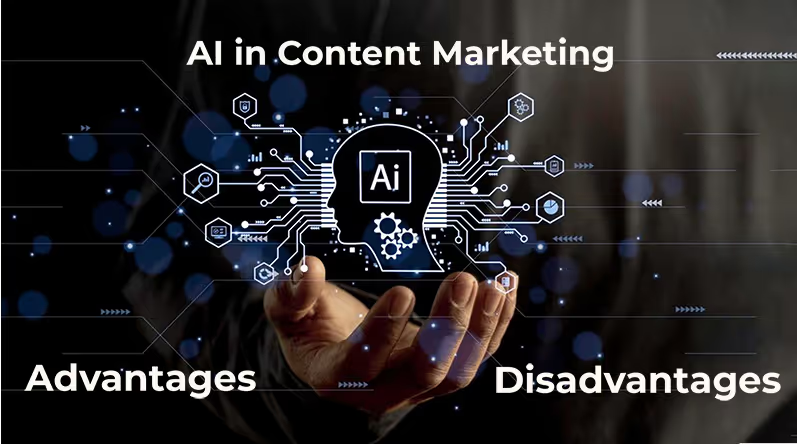
Advantages of AI in Content Marketing:
1. Efficiency and Automation:AI streamlines content creation, distribution, and analysis, automating time-consuming tasks and boosting overall efficiency.2. Enhanced Personalization:AI analyzes user data to deliver personalized content experiences, catering to individual preferences and increasing audience engagement.3. Data-Driven Insights:AI processes extensive datasets to provide actionable insights, enabling data-driven decision-making for content optimization.4. SEO Optimization:AI optimizes content for search engines by analyzing algorithms, ensuring it aligns with SEO best practices and ranks prominently.5. Improved User Experience:AI-powered chatbots and virtual assistants enhance user experience through instant responses and personalized interactions.6. Content Quality and Consistency:AI tools maintain content quality by analyzing language nuances and ensuring consistency, elevating the overall standard.7. Predictive Analytics:AI predicts emerging trends, allowing marketers to proactively align content strategies with current interests and market shifts.8. Adaptive Marketing Strategies:AI adapts content strategies in real-time based on user behavior, market dynamics, and feedback, ensuring continuous optimization.9. Content Editing and Proofreading:AI aids in content editing and proofreading, ensuring grammatical accuracy and expediting the review process.
Disadvantages Of AI In Content Marketing:
1. Initial Implementation Costs:Integrating AI may involve initial setup costs and training, potentially posing financial challenges for smaller businesses.2. Dependency on Data Quality:AI effectiveness relies on the quality of input data; inaccurate or biased data can lead to flawed insights.3. Loss of Human Touch:Over-reliance on AI may compromise the emotional connection in content, as the human touch becomes secondary.4. Potential Job Displacement:Automation of certain tasks may lead to job displacement for roles involved in routine content creation and analysis.5. Complexity and Learning Curve:AI systems' complexity may present a steep learning curve, necessitating training and expertise for optimal use.6. Ethical Concerns:Ethical concerns arise in content creation, as AI may inadvertently generate misleading or inappropriate content without proper oversight.7. Lack of Creativity:While excelling at data-driven tasks, AI may lack the creativity and intuition inherent in human-driven content development.8. Overreliance on Predictive Analytics:Sole reliance on predictive analytics may lead to rigid content strategies, potentially overlooking unexpected trends or shifts in audience behavior.9. Security and Privacy Risks:Storing and processing large volumes of data for AI purposes poses security and privacy risks, demanding robust measures to safeguard sensitive information.Navigating the integration of AI in content marketing requires a nuanced understanding of its strengths and limitations, allowing marketers to harness its advantages while addressing potential challenges for a well-rounded and effective strategy.
Overcoming Challenges In Marketing Content Creation
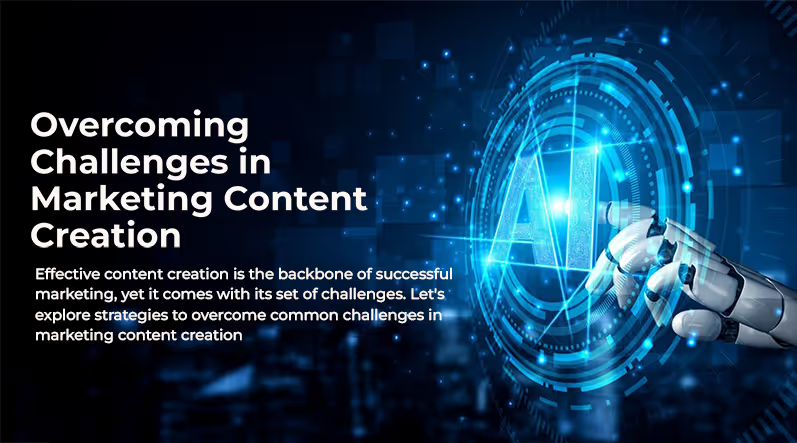
Effective content creation is the backbone of successful marketing, yet it comes with its set of challenges. Addressing and overcoming these challenges is crucial for maintaining a streamlined and impactful content marketing strategy. Let's explore strategies to overcome common challenges in marketing content creation:1. Challenge: Limited ResourcesStrategy: Prioritize and focus on high-impact content. Leverage automation tools for repetitive tasks, and consider outsourcing or collaboration to supplement internal resources.2. Challenge: Maintaining Consistent QualityStrategy: Develop clear content guidelines and quality standards. Implement a robust review process and invest in training for content creators to ensure adherence to brand standards.3. Challenge: Content Personalization at ScaleStrategy: Utilize AI-driven personalization tools to dynamically tailor content based on user behavior and preferences. Segment your audience strategically and create content variations to cater to diverse interests.4. Challenge: Keeping Pace with TrendsStrategy: Stay informed about industry trends through continuous learning. Encourage a culture of curiosity within your team, and allocate time for regular trend analysis and brainstorming sessions.5. Challenge: Consistent Brand Voice Across ChannelsStrategy: Develop a comprehensive style guide that outlines your brand voice and tone. Ensure regular communication and training to align the content team with the brand's messaging strategy.6. Challenge: Balancing SEO and CreativityStrategy: Integrate SEO considerations into the content planning process. Conduct keyword research and identify opportunities for optimization while preserving the creative integrity of the content.7. Challenge: Audience EngagementStrategy: Foster engagement by encouraging audience participation. Incorporate interactive elements such as polls, quizzes, and surveys. Actively respond to comments and feedback to create a sense of community.8. Challenge: Diverse Content FormatsStrategy: Diversify your content formats to cater to different audience preferences. Experiment with videos, infographics, podcasts, and written content. Analyze performance data to refine your approach.9. Challenge: Measuring Content ROIStrategy: Establish clear goals and key performance indicators (KPIs) for each piece of content. Leverage analytics tools to track performance, measure engagement, and assess the impact on business objectives.10. Challenge: Adapting to Algorithm ChangesStrategy: Stay informed about algorithm changes on major platforms. Diversify your content distribution channels to reduce dependency on any single platform. Focus on creating high-quality, shareable content.11. Challenge: Content RepurposingStrategy: Develop a content repurposing strategy to maximize the value of existing content. Identify evergreen pieces that can be updated or repackaged into different formats for renewed relevance.12. Challenge: Content Collaboration Across TeamsStrategy: Foster open communication between marketing, sales, and other relevant teams. Implement collaborative tools and hold regular cross-functional meetings to ensure alignment in content goals and strategies.By proactively addressing these challenges, content creators can build a resilient and adaptable approach to content marketing. Embracing innovation, leveraging technology, and fostering a culture of continuous improvement are key elements in overcoming the hurdles of content creation in the ever-evolving digital landscape.
Best Practices For Marketers Leveraging Generative AI
Effective content creation is the backbone of successful marketing, yet it comes with its set of challenges. Addressing and overcoming these challenges is crucial for maintaining a streamlined and impactful content marketing strategy. Let's explore strategies to overcome common challenges in marketing content creation:1. Understand Your Audience:Before using generative AI, deeply understand your target audience. Analyze their preferences, behaviors, and pain points to guide the AI in creating content that resonates.2. Define Clear Objectives:Establish clear goals for using generative AI, whether it's to enhance content creation, personalize user experiences, or streamline processes. Align these objectives with broader marketing strategies.3. Human-AI Collaboration:View generative AI as a collaborative tool rather than a replacement. Combine the creativity of human marketers with the efficiency and data processing capabilities of AI for optimal results.4. Continuous Monitoring and Evaluation:Regularly monitor the output of generative AI models. Evaluate the quality, relevance, and alignment with brand guidelines. Adjust the models based on performance feedback.5. Maintain Brand Voice and Consistency:Provide clear guidelines to the AI model to ensure content aligns with your brand voice and values. Regularly review and refine these guidelines to maintain consistency across all AI-generated content.6. Ethical Considerations:Be aware of ethical concerns related to AI-generated content, such as misinformation or biased outputs. Implement safeguards and ethical guidelines to ensure responsible use.7. Data Privacy and Security:Prioritize the security and privacy of data used by generative AI models. Adhere to data protection regulations and establish robust security measures to safeguard sensitive information.8. A/B Testing and Optimization:Implement A/B testing to compare AI-generated content with traditional content. Use the insights gained to optimize the AI models continually and improve performance.9. Educate and Train Marketers:Provide training to marketing teams on understanding and working alongside generative AI. Encourage a culture of learning and experimentation to maximize the technology's potential.10. Customization for Specific Platforms:Tailor the AI-generated content for specific platforms and channels. Understand the nuances of each platform's audience and engagement patterns to enhance the effectiveness of the content.11. Combine Creativity with Data:Merge the creative instincts of marketers with the data-driven capabilities of AI. Use AI insights to inform creative decisions, fostering a harmonious balance between intuition and analytics.12. Iterative Refinement:Approach generative AI as an evolving tool. Regularly review and refine the models based on performance data, user feedback, and changing market dynamics.13. Legal Compliance:Ensure that AI-generated content complies with copyright laws and intellectual property rights. Be cautious about potential legal issues related to content ownership and usage.14. Transparent Communication:Communicate transparently with your audience about the use of AI-generated content. Establish trust by being open about the technology's role in content creation.15. Scalability Considerations:Evaluate the scalability of your generative AI solutions. Ensure that they can accommodate increasing content demands and evolving business requirements.By incorporating these best practices, marketers can harness the full potential of generative AI while mitigating challenges and ensuring a responsible and effective integration into their content strategies.
Can Google Detect AI Content Generation?
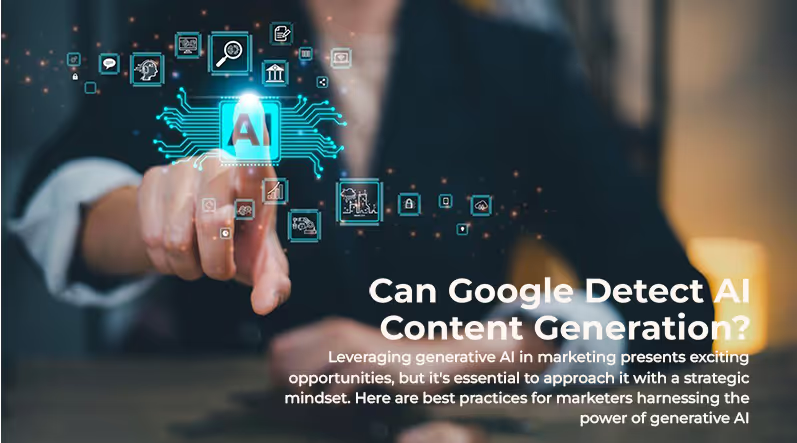
Leveraging generative AI in marketing presents exciting opportunities, but it's essential to approach it with a strategic mindset. Here are best practices for marketers harnessing the power of generative AI:1. Understand Your Audience:Before using generative AI, deeply understand your target audience. Analyze their preferences, behaviors, and pain points to guide the AI in creating content that resonates.2. Define Clear Objectives:Establish clear goals for using generative AI, whether it's to enhance content creation, personalize user experiences, or streamline processes. Align these objectives with broader marketing strategies.3. Human-AI Collaboration:View generative AI as a collaborative tool rather than a replacement. Combine the creativity of human marketers with the efficiency and data processing capabilities of AI for optimal results.4. Continuous Monitoring and Evaluation:Regularly monitor the output of generative AI models. Evaluate the quality, relevance, and alignment with brand guidelines. Adjust the models based on performance feedback.5. Maintain Brand Voice and Consistency:Provide clear guidelines to the AI model to ensure content aligns with your brand voice and values. Regularly review and refine these guidelines to maintain consistency across all AI-generated content.6. Ethical Considerations:Be aware of ethical concerns related to AI-generated content, such as misinformation or biased outputs. Implement safeguards and ethical guidelines to ensure responsible use.7. Data Privacy and Security:Prioritize the security and privacy of data used by generative AI models. Adhere to data protection regulations and establish robust security measures to safeguard sensitive information.8. A/B Testing and Optimization:Implement A/B testing to compare AI-generated content with traditional content. Use the insights gained to optimize the AI models continually and improve performance.9. Educate and Train Marketers:Provide training to marketing teams on understanding and working alongside generative AI. Encourage a culture of learning and experimentation to maximize the technology's potential.10. Customization for Specific Platforms:Tailor the AI-generated content for specific platforms and channels. Understand the nuances of each platform's audience and engagement patterns to enhance the effectiveness of the content.11. Combine Creativity with Data:Merge the creative instincts of marketers with the data-driven capabilities of AI. Use AI insights to inform creative decisions, fostering a harmonious balance between intuition and analytics.12. Iterative Refinement:Approach generative AI as an evolving tool. Regularly review and refine the models based on performance data, user feedback, and changing market dynamics.13. Legal Compliance:Ensure that AI-generated content complies with copyright laws and intellectual property rights. Be cautious about potential legal issues related to content ownership and usage.14. Transparent Communication:Communicate transparently with your audience about the use of AI-generated content. Establish trust by being open about the technology's role in content creation.15. Scalability Considerations:Evaluate the scalability of your generative AI solutions. Ensure that they can accommodate increasing content demands and evolving business requirements.By incorporating these best practices, marketers can harness the full potential of generative AI while mitigating challenges and ensuring a responsible and effective integration into their content strategies.
Can Google Detect AI Content Generation?
As of my last knowledge update in January 2022, Google does not have a specific algorithm designed to detect whether content was generated by AI. Google's algorithms primarily focus on assessing the quality, relevance, and user experience of content. However, Google is continuously evolving its algorithms to combat spam, low-quality content, and manipulative practices.Here are a few points to consider:1. Content Quality:Google emphasizes delivering high-quality, valuable content to users. If AI-generated content provides relevant and informative material that aligns with user intent, it may be well-received by Google.2. User Engagement:Metrics like user engagement, click-through rates, and time spent on a page contribute to Google's evaluation of content. If AI-generated content fails to engage users or results in high bounce rates, it may affect its ranking.3. Natural Language Processing:Google uses natural language processing to understand the context and semantics of content. Well-written AI content that reads naturally and coherently is less likely to trigger alarms.4. Avoiding Duplicate or Spun Content:Google penalizes duplicate content or content that appears to be spun from existing material. AI-generated content should provide unique value to users to avoid being flagged.5. Adherence to Guidelines:Following Google's guidelines for webmasters and content creators is essential. Any attempt to manipulate search results, whether through AI or other means, could result in penalties.It's crucial to stay updated on industry trends and Google's evolving algorithms, as the landscape may have changed since my last update. Google has a vested interest in providing users with the best possible search experience, and any attempts to deceive or manipulate search results are generally discouraged.Always prioritize creating content that serves the needs of your audience, adheres to ethical practices, and complies with search engine guidelines to ensure long-term visibility and success in search rankings.
AI In Content Marketing Channels
Artificial Intelligence (AI) is reshaping content marketing across various channels, enhancing efficiency, personalization, and audience engagement. Here's how AI is making an impact on different content marketing channels:1. Website Content:AI is used to create and optimize website content, ensuring it aligns with SEO best practices. Chatbots powered by AI provide instant assistance, enhancing the overall user experience.2. Blogs and Articles:AI-driven tools aid in generating blog posts and articles by analyzing trends, optimizing for SEO, and even mimicking specific writing styles. Content created with AI assistance can be both efficient and high-quality.3. Email Marketing:AI optimizes email marketing by personalizing content based on user behavior and preferences. It helps in crafting compelling subject lines, segmenting audiences, and determining the best times to send emails.4. Social Media:AI enhances social media content through data analysis, trend identification, and audience segmentation. Chatbots and automated responses powered by AI engage with users in real-time, fostering interaction.5. Video Content:AI is used to analyze data and user behavior to determine video content preferences. Video editing tools powered by AI automate tasks like editing, captioning, and even generating thumbnails.6. Podcasts and Audio Content:AI can assist in transcription services for podcasts and audio content, making it searchable and accessible. Voice-activated AI tools are also becoming integral in creating interactive audio experiences.7. Interactive Content:AI-driven interactive content, such as quizzes, polls, and surveys, engages users by providing personalized experiences. These interactive elements are tailored based on user responses, enhancing user involvement.8. E-commerce Product Descriptions:AI-generated product descriptions help e-commerce businesses efficiently create unique and appealing content for a large number of products. This ensures consistency and accuracy in product information.9. Chatbots and Messaging Apps:AI-powered chatbots engage with users on websites and messaging apps, providing instant responses and assistance. They are capable of understanding user queries and providing relevant information.10. Content Aggregation Platforms:AI assists in curating and recommending content on aggregation platforms. It analyzes user preferences and behavior to deliver personalized content recommendations.11. SEO and Content Optimization:AI algorithms analyze search engine algorithms to optimize content for SEO. This includes keyword analysis, content recommendations, and predicting changes in search engine criteria.12. Virtual and Augmented Reality (VR/AR):AI contributes to the creation of immersive content experiences in virtual and augmented reality. It enhances user interactions within these environments, providing a personalized and engaging experience.In each of these channels, the integration of AI brings efficiency, personalization, and data-driven decision-making. As AI continues to advance, its role in content marketing will likely expand, offering marketers new and innovative ways to connect with their audiences across diverse platforms.
AI In Content Marketing KPIs
The integration of Artificial Intelligence (AI) in content marketing introduces new Key Performance Indicators (KPIs) to measure the impact and effectiveness of AI-driven strategies. Here are some essential KPIs to consider when assessing the performance of AI in content marketing:1. Content Engagement Rate:Definition: The percentage of users who interact with AI-generated content, such as clicking on articles, engaging with chatbots, or participating in interactive elements.Importance: Reflects the level of user interest and interaction with AI-driven content.2. Personalization Effectiveness:Definition: Measures how well AI-driven personalization efforts align with individual user preferences and behaviors.Importance: Indicates the success of AI in tailoring content to specific audience segments.3. Conversion Rate:Definition: The percentage of users who complete a desired action, such as making a purchase, signing up for a newsletter, or filling out a form, after interacting with AI-generated content.Importance: Gauges the effectiveness of AI content in driving desired outcomes.4. Time on Page/Session Duration:Definition: The average amount of time users spend on a page or engaging with content generated by AI.Importance: Indicates user engagement and the quality of the content provided by AI algorithms.5. Bounce Rate:Definition: The percentage of users who navigate away from the site or leave the page without interacting further after viewing AI-generated content.Importance: High bounce rates may suggest a mismatch between user expectations and the content provided.6. Click-Through Rate (CTR):Definition: The percentage of users who click on a link or call-to-action within AI-generated content.Importance: Measures the effectiveness of AI content in prompting further user action.7. Lead Generation Quality:Definition: Evaluates the quality of leads generated through AI-driven interactions, assessing their likelihood of conversion.Importance: Helps identify the impact of AI on the lead generation process.8. Return on Investment (ROI):Definition: The ratio of the net profit generated by AI-driven content marketing efforts to the overall costs.Importance: Quantifies the financial impact of AI in content marketing.9. Customer Retention Rate:Definition: Measures the percentage of customers who continue to engage with the brand or content over time.Importance: Indicates the ability of AI to contribute to long-term customer relationships.10. Social Media Engagement:Definition: Measures user interactions, such as likes, shares, and comments, on content shared through AI-driven strategies on social media platforms.Importance: Assesses the effectiveness of AI content in sparking social engagement.11. Accuracy of Predictive Analytics:Definition: Evaluates how well AI algorithms predict user behavior, trends, and content preferences.Importance: Assures the reliability of AI-generated insights for strategic decision-making.12. Customer Satisfaction Scores:Definition: Measures customer satisfaction with AI-driven interactions and content.Importance: Provides direct feedback on the user experience and effectiveness of AI implementations.Regularly tracking these KPIs allows marketers to assess the impact of AI on content marketing strategies, identify areas for improvement, and optimize campaigns for maximum effectiveness.
AI In Content Marketing Examples
AI is transforming content marketing by automating processes, enhancing personalization, and improving overall efficiency. Here are examples of how AI is being utilized in various aspects of content marketing:1. Content Creation:OpenAI's GPT-3 can generate human-like text based on prompts, enabling the creation of articles, blog posts, and product descriptions.2. Chatbots and Virtual Assistants:Chatbots on websites and messaging apps, powered by AI, engage with users in real-time, answering queries, providing information, and guiding them through the user journey.3. Personalization:AI algorithms analyze user behavior, preferences, and historical data to deliver personalized content recommendations on websites, emails, and other platforms.4. SEO Optimization:AI tools analyze search engine algorithms and user search patterns to optimize content for relevant keywords, improving search rankings.5. Email Marketing:AI is used to personalize email content based on user behavior, segment audiences, and determine the optimal timing for sending emails to improve engagement.6. Content Curation:AI-powered content curation platforms analyze user interests, social trends, and industry news to curate relevant and timely content for audiences.7. Video Content Creation:AI-driven tools assist in video editing, automated subtitling, and even generating realistic deepfake videos for marketing purposes.8. Predictive Analytics:AI analyzes historical data to predict future trends, enabling marketers to proactively create content aligned with emerging interests.9. Social Media Management:AI tools schedule posts, analyze social media trends, and recommend content strategies for platforms like Facebook, Twitter, and Instagram.10. Data Analysis and Reporting:AI algorithms process large datasets to provide insights into content performance, audience behavior, and key metrics for informed decision-making.11. Voice Search Optimization:AI helps optimize content for voice search by understanding natural language queries and tailoring content to match conversational patterns.12. Content Editing and Proofreading:AI-powered tools assist in grammar checking, language style suggestions, and content optimization to enhance overall quality.13. Interactive Content:AI-driven interactive elements, such as quizzes, polls, and surveys, provide personalized and engaging content experiences for users.14. E-commerce Product Recommendations:AI analyzes user purchase history, browsing behavior, and preferences to recommend personalized products on e-commerce platforms.15. Content Distribution:AI algorithms analyze audience data to determine the most effective channels and times for content distribution, maximizing reach and engagement.These examples showcase the diverse applications of AI in content marketing, demonstrating how it is reshaping the industry by automating tasks, enhancing personalization, and providing valuable insights for marketers.
5 Free AI Tools For Content Creation You Need To Checkout In 2024
As of my last knowledge update in January 2022, I can provide information on some popular AI tools for content creation. Keep in mind that the availability and popularity of tools can change, so it's a good idea to check for the latest options. Here are five AI tools that were noteworthy for content creation:1.OpenAI's GPT-3:GPT-3, developed by OpenAI, is a powerful language generation model. It can be used for a variety of content creation tasks, including writing articles, generating creative content, and more. Several platforms and tools have integrated GPT-3 for different applications.2. Copy.ai:Copy.ai is a tool that utilizes GPT-3 to help users generate human-like and engaging content. It can be used for creating marketing copy, blog posts, product descriptions, and more. Users input a prompt, and the tool generates text based on that prompt.3. ShortlyAI:ShortlyAI is another tool that uses GPT-3 to assist in content creation. It is designed to generate content quickly and efficiently. Users input prompts or descriptions, and the tool generates coherent and contextually relevant text.4. Snazzy AI:Snazzy AI focuses on helping users generate catchy and persuasive content for marketing purposes. It can be used for creating headlines, ad copy, and other promotional content. The tool aims to enhance the effectiveness of marketing messages.5. Wordtune:Wordtune is an AI-powered writing assistant that helps users improve the clarity, tone, and style of their writing. It provides suggestions for rephrasing sentences, making content more engaging, and ensuring it aligns with the desired tone.Before using any tool, it's essential to review their features, terms of use, and user reviews to determine if they meet your specific content creation needs. Additionally, the landscape of AI tools is dynamic, so new tools may emerge over time. Always ensure that the tools you choose align with your content strategy and goals.
Conclusion
The integration of artificial intelligence into content marketing represents a pivotal shift in how we conceptualize, create, and distribute digital content. The evolution of AI, exemplified by cutting-edge models like GPT-3, has not only streamlined content creation processes but has redefined the very essence of user engagement. From personalized interactions facilitated by AI-driven chatbots to dynamic content recommendations tailored to individual preferences, the user experience has reached unprecedented levels of customization. Beyond content creation, AI's prowess in data-driven decision-making, predictive analytics, and multi-channel optimization has become the cornerstone of successful content marketing strategies. However, with these advancements come ethical considerations, urging marketers to navigate the fine line between automation and human touch while ensuring data privacy. As we chart the future of content marketing, the dynamic interplay between human creativity and AI capabilities promises continued innovation, adaptability, and a digital landscape that evolves hand-in-hand with the ever-changing needs of our audiences.Don't miss out on the opportunity to elevate user engagement, streamline content creation, and make informed, data-driven decisions. Embrace the future of content marketing – embark on a transformative journey today.

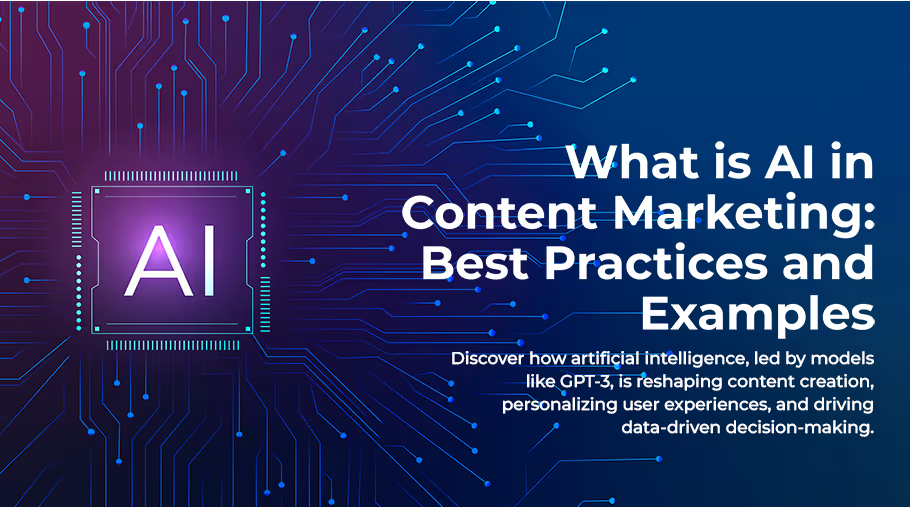

.svg)
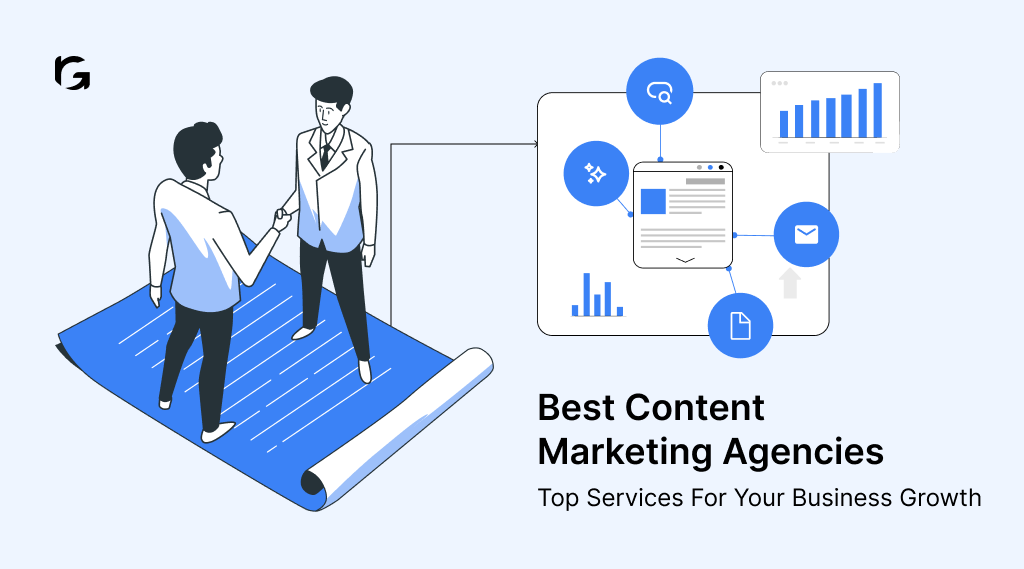
.png)
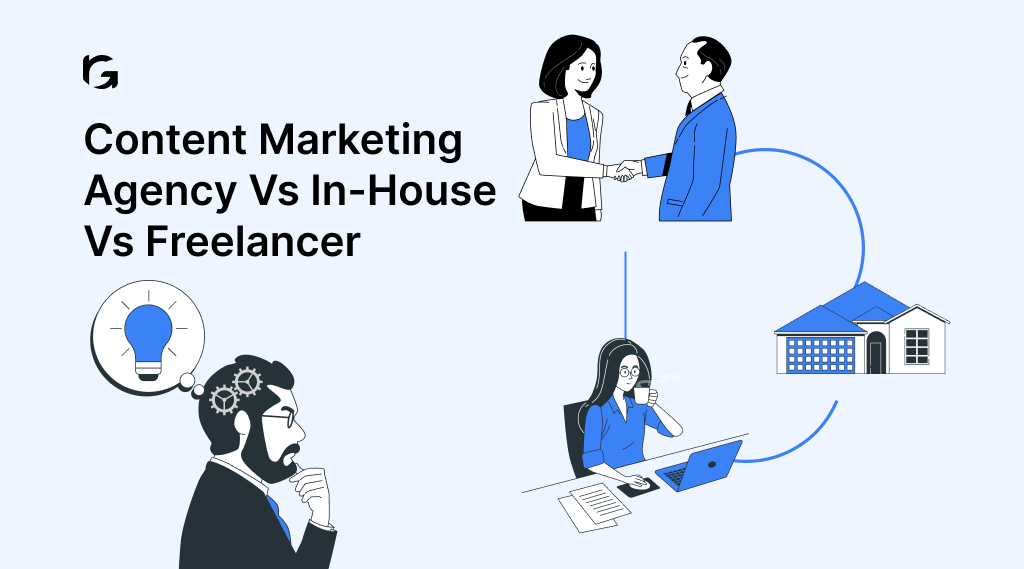
.webp)